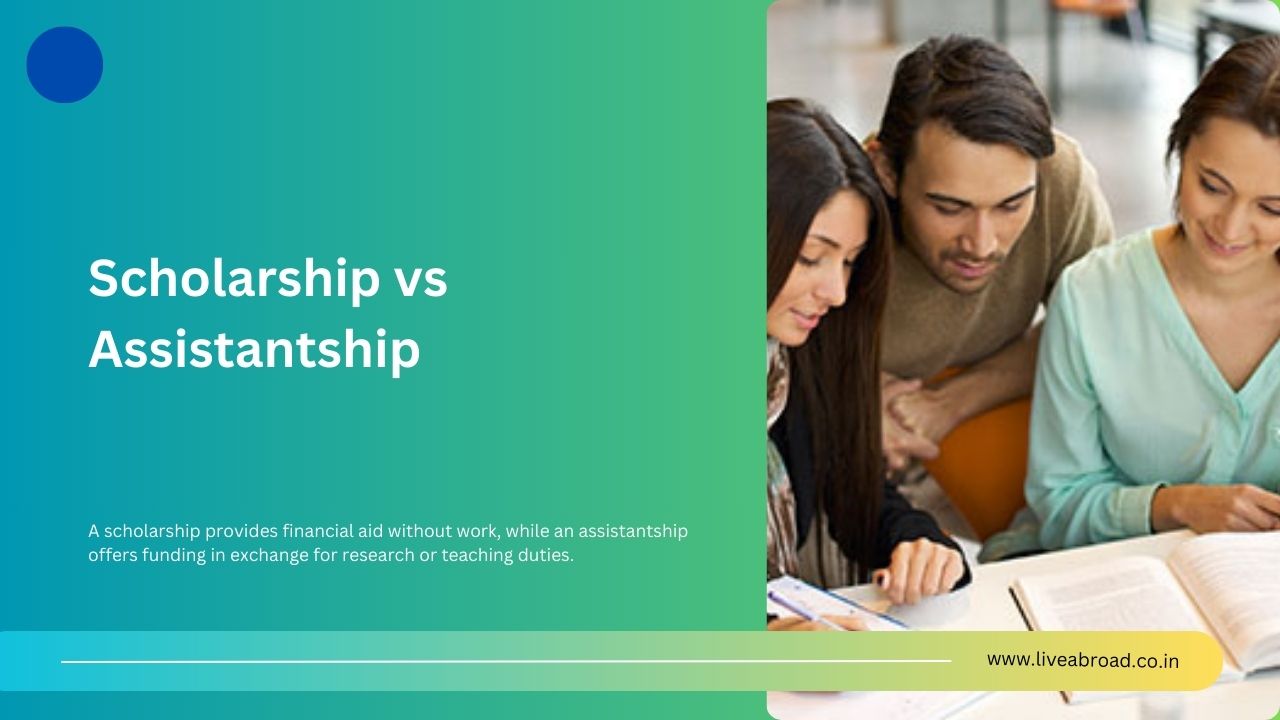Learn about two of the most trusted ways to cover study-abroad expenses
A critical component of the planning process for studying abroad is financial planning. It is imperative to secure an appropriate scholarship or apply for an education loan unless you have substantial savings to fall back on. Nevertheless, the majority of students who are interested in scholarships are unaware that merit scholarships are not their sole alternative. A diverse array of fee waivers and work-study programs are available to assist in the financing of your studies and living expenses while abroad. Two reliable methods of managing study-abroad expenses are scholarships and assistantships.
What is a scholarship?
A scholarship is a form of financial assistance that is non-returnable and is typically awarded to a student based on their academic performance, extracurricular excellence, or financial need. It provides coverage for a portion (or, in certain instances, the entire) of the student’s study abroad expenses. The university, the government, a specific subject department, or an alumnus may all contribute to the funding of a scholarship.
Different types of scholarships
- Merit-based: This is contingent upon the academic or extracurricular accomplishments of the pupil.
- Student-specific: Applicants who satisfy the application criteria in terms of their gender, race, religion, familial background, and medical history.
- Destination-specific: Bursaries and funds that are awarded to students from a specific country.
- Subject-specific: Grants are granted to students for a particular discipline of study by specific universities.
- Need-based: Intended for pupils who are experiencing financial hardships as a result of their parent’s financial circumstances.
- Athletic scholarships: Athletic bursaries are awarded to exceptional athletes who can serve as ambassadors for the university.
What is an assistantship?
A student’s field of study is the subject of paid on-campus employment through an assistantship. It is comparable to a work-study program in that it enables the student to earn a specific quantity of money to assist in the payment of their expenses. However, in this instance, the student is responsible for duties associated with teaching or research for faculty members and/or the designated subject department, rather than working in the cafeteria or housekeeping. This is typically limited to 20 hours per week in exchange for a stipend or tuition fee reimbursement.
Different types of assistantships
A student may have the opportunity to select the type of function they wish to fulfill as part of the assistantship, contingent upon the university or course. In general, there are two distinct categories of paid student assistantships:
- Teaching Assistantship: The student assists the faculty in the preparation of lesson plans, the organization of learning activities, the maintenance of records, and the management of class behavior. They may also provide remedial assistance to students in the class. Additionally, you may be obligated to instruct specific syllabus components.
- Research Assistantship: The student assistant assists the faculty by verifying and organizing research data, evaluating research strategies, composing research reports, and identifying areas for improvement. This work will not necessarily be relevant to your personal area of interest; however, it will undoubtedly contribute to your professional development by providing you with the opportunity to exercise research tools.
How to apply for a scholarship?
The scholarship application process may differ among universities. In general, applicants must have achieved a minimum of 60% in their academic pursuits at the secondary and/or undergraduate levels in order to qualify.
In order to secure a substantial quantity of merit-based scholarship, it is necessary to submit mark sheets that demonstrate academic excellence. In the same vein, it is necessary to submit supporting documents for an athletic, region-based, or minority scholarship.
In addition, you will be required to submit your financial documents, proof of your parent’s employment, and pertinent tax documents in order to qualify for a need-based scholarship.
Additionally, the university may mandate that you compose an essay or letter in order to argue your case in comparison to the other applicants.
How to apply for an assistantship?
The application process for an assistantship may differ among institutions. Nevertheless, this is the typical application process:
- Satisfying the minimum GPA requirement
- Test scores that are standardized
- A satisfactory accomplishment during the interview phase
In order to ensure that the assistantship work does not affect your grades, your department or interviewer would attempt to determine whether you are a meritorious, organized student who is proficient in time management.
| Scholarship | Assistantship | ||
| 1 | Basic concept | Financial assistance that is non-refundable and is awarded on the basis of need or merit | Fee reimbursement or stipend in exchange for on-campus work in your field of study |
| 2 | Types | Merit-basedStudent specificDestination specificSubject-specificAthletic scholarshipsNeed-based | Teaching AssistantshipResearch Assistantship |
| 3 | Application | Satisfactory GPA scoresPersonal essayDocuments supporting grounds of the applicationstandardized test scores | Satisfactory GPA scoresInterview performancestandardized test scores |
Scholarships and assistantships are not only an excellent method of reducing the cost of studying and residing abroad, but they also enhance the visibility of your resume. These attributes enhance your employability and position you as an exceptional candidate for your employer, thereby increasing your likelihood of receiving an above-average salary.
Due to the prestige of international scholarships and assistantships, applicants should anticipate intense competition when submitting an application. It is always advisable to begin the process of planning your application in advance in order to gain an advantage over your peers. Liveabroad’s international education specialists can provide you with a variety of expert advice to improve your application. Consequently, whether you are experiencing anxiety, have questions, or require guidance regarding your application, please do not hesitate to contact us.
